Food can unite and bring people together, and contribute to social change. LFC student Berfin Nur Osso tells about the new initiative Food for Good, and shares her experience starting a social enterprise in Tampere. Get inspired!
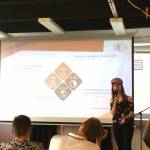
Berfin, please tell us about the new initiative you have started recently!
Food for Good is a freshly established initiative founded by immigrants to create an impact within the society by evoking empathy and embracing the universality of food, regardless of people’s nationality, race, religion, ethnic origin, or political opinion. The ultimate goal of the initiative is creating a migrant kitchen, which consists of the flavors from various cuisines from around the world, cooked by the immigrants. The idea is to deliver the food through a mobile application together with the stories of the migrant cooks and the couriers. Eventually, this would enable empathy to the immigrants by learning about their stories, the challenges they face, and the arduous journey they have gone through before and after coming to Finland.
Just like Food for Good, there are various migrant and refugee initiatives around the world involving food. Both A Taste of Home in Zagreb, Croatia and The Newcomer Kitchen in Toronto, Canada are run by refugees, migrants and volunteers. They are mostly funded by crowdfunding and serve for a better society. Their common purpose is to help refugees and migrants to earn a living and become settled through culinary and cultural exchange.
What is the purpose of this initiative? What is its impact?
Migrants are one of the most marginalized segments within a society. Their struggles of finding a job and getting accustomed to the life as an expat are often disregarded by the local community. For this reason, Food for Good aims to enable cultural exchange within the community through promoting various cuisines from around the world, and to eliminate discrimination against the migrants, as well as to create job opportunities for them. Yes, we are talking about several causes in one initiative! Migrants – e.g. students, refugees, asylum-seekers, economic migrants – cook the food, and their stories are shared together with the masterpieces they create. Every story is unique, and Food for Good would like this uniqueness to be known by everyone: how migrants came to Tampere, what is the driving reason that made them end up in here, and what is it like to live in this community. And most importantly, why did they choose to stay here.
How did you come up with the idea?
On one morning in May, I just woke up with the idea, It was the time when I was a bit fed up with job and internship applications, to which I had paid a lot of effort and time for about five months. A week before I came up with the idea, I was talking with my Turkish friend Kagan, who had organized a pop-up kitchen last year at Ravintolapäivä (Restaurant Day) in Tampere by presenting various vegan and vegetarian flavors from Turkish cuisine.
Initially I revealed the idea to Y-Kampus at the University of Tampere, attended the first workshop of the impact coaching program, and then unveiled my plans to Kagan, to which he said “Yes!”. That was also something very similar to the idea of a vegetarian and vegan restaurant that he was thinking to establish after he was influenced by the devastating refugee crisis.
Yes, it was 9 am in the morning when I came up with the idea. I made an initial sketch, which involves the logo, an overview of the idea, and even a SWOT analysis! Just before organizing our first food tasting event at Tribe Tampere, everything went with the flow: I began to brand the idea, design the logo on Photoshop, create a Facebook page, a menu and a PowerPoint template. Now Kagan and I are officially partners, and the driving force behind Food for Good.
Everyone likes food, regardless the borders and barriers by which we are surrounded in today’s world, and thus food can involve a good cause and function as a medium that unites the society and brings one of the most marginalized segments of the society together.
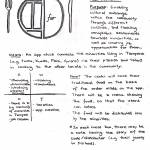
So how does this all happen? And what is the difference between Food for Good and other organizations?
Food for Good unites talented cooks, who have immigrated to Tampere, with the foodies – who are migrants as well as Finns. And the connecting factor is food! In this respect, food is only a medium that brings people together. Food for Good is distinguished by other organizations, e.g. from one-time pop-up stalls or for-profit restaurants, because it aims to create a greater impact within the society and unite the migrants and the local community. Making profit is not the primary purpose and Food for Good does not generate profits, but in order to make our initiative self-sustainable, tips or small amounts of participation fees can be requested from the participants of our events.
Initially, the idea is to periodically set up several pop-up stalls located both indoors (e.g. Tribe Tampere) and outdoors (e.g. parks), and involving the flavors from various cuisines cooked by the migrants. The ultimate goal is to establish a migrant kitchen representing various cuisines, made by migrants from around the world (e.g. Latin America, Africa, Middle East, South East Asia), and deliver food through a mobile application.
Have you organized any public events concerning this initiative? How can people participate in your activities?
The first public event we organized was the Turkish Food Tasting event at Tribe Tampere on June 14. Kagan and I cooked four different Turkish dishes and shared them with the participants who represented various countries. We created an event on Facebook and first invited our friends, but the event turned out to be a success story with over 11k reach and over 240 responses! I wasn’t expecting to access that many people and create such a big impact, especially in the first event. We ended up hosting over 40 people who loved what we cooked and what we try to achieve through Food for Good. At this point, we’re also very thankful to Tribe Tampere as they allowed us to organize such an event and sponsored us for the budget.

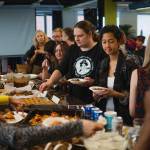
What would you say to people who are thinking of starting social entrepreneurship projects of their own? How can they start, what should they take into account, what advice would you give to them?
For those who want to start their own social enterprise, there is one simple, but very significant step: Action! Because without it, no idea can be realized — it would only remain as a cloud somewhere in the sky! Of course, lots of drawbacks and challenges can be involved on the journey: pertaining to motivation, to the people who don’t keep their promises, or even to yourself. But it is also important to embrace our failures; that’s also a way to grow and learn. As residents of Tampere, I think we’re very lucky to have a city, which offers several hubs and working spaces for startups where people can gather, plan, design, prototype, and test their ideas! And Tribe Tampere is just one of the many hubs. For instance, if I hadn’t gone to Y-kampus on the day I came up with the idea, I might have bot been motivated to actualize it. Especially after seeing the outcomes of our first event, I can say that it has been totally worth it to reveal my idea and take action!
Who can join Food for Good and how can people participate in it?
Everyone, both immigrants and Finns, can participate in Food for Good. Immigrants can display their cooking skills and everyone can help us to develop our initiative in terms of marketing, outreach, fundraising or social media. Currently, everything is on a voluntary basis, so we would like everyone to be engaged in Food for Good in order to create a positive impact within the society.
Our next event will take place during the summer, so stay tuned! If you want to join the universality of food and embrace it all together, you can visit our website, follow our Facebook page and send us an email.
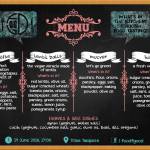


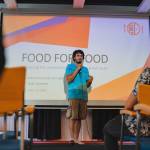
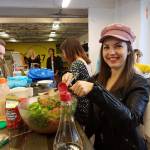
Comments